Hadassah
Feature
From Passion to Action: Women’s Health Empowerment Summit
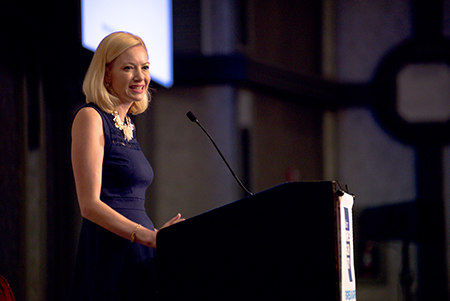
Starr Mirza awoke in a Florida emergency room at the age of 22 to find she had suffered cardiac arrest. And she was elated. For more than 10 years prior to that moment, Mirza had complained of exhaustion, flu-like symptoms and feeling faint, but doctors could find nothing wrong, dismissing her as, essentially, an attention-seeking drama queen. Eventually, so did her family and friends. And Mirza, then clueless about her Long QT Syndrome—a rare heart disorder that can cause dangerously fast and erratic heart rhythms—began to believe them.
“Had one person listened to me and believed I was sick, that would have changed my whole world,” Mirza, now 38, told hundreds of Hadassah delegates gathered on May 16 at the Capital Hilton in Washington, D.C., for the Women’s Health Empowerment Summit. Presented by the Coalition for Women’s Health Equity, a group of 28 health and women’s organizations convened by Hadassah to press for gender equity in medical research and care, the summit was a cornerstone of Hadassah’s From Passion to Action: Women’s Health and Advocacy Conference from May 15 to 17 that culminated with a day of lobbying on Capitol Hill.
Mirza’s quest for recognition and support was a fitting framework for the summit, which also highlighted the #MeToo movement and the broader call for women to be seen, heard and treated justly.
“That feeling of being disregarded—what a common thread,” said summit keynote speaker Fatima Goss Graves, president and CEO of the National Women’s Law Center, referencing Mirza’s experience. Graves discussed the burgeoning number of sexual harassment victims seeking representation from her group and the more than 500 attorneys who have joined its Time’s Up Legal Defense Fund to fight for them. “We will win,” she said, “and we will heal.”
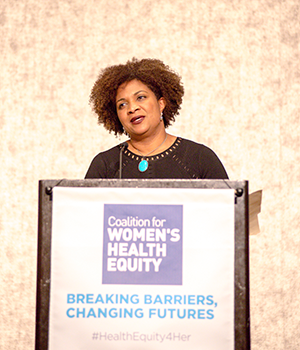
The second annual women’s health summit featured an array of subjects and speakers detailing the challenges facing women’s health care. Patients, experts and panelists addressed gender bias in mental health, the pressures saddling female caregivers and the lack of women’s participation in medical trials. (Read our report of a panel discussion moderated by PBS’s Judy Woodruff that focused on protecting patient data as well as our coverage of the Touch of Red Gala.)
“Women’s health equity certainly doesn’t advance itself. It’s something we need to do for ourselves,” said Hadassah National President Ellen Hershkin. The conference exemplified Hadassah’s tagline “the power of women who do,” Hershkin added. “We not only do. We did.”
Coinciding with national Women’s Health Week, the three-day conference—much of which was captured on video and is available on Hadassah’s website—reflected a bolstered commitment to the organization’s lifelong pursuit of women’s health.
“We’re trying to raise women’s consciousness about things that impact them,” said Janice Weinman, Hadassah’s executive director and CEO. The Coalition for Women’s Health Equity, which Hadassah formed two years ago, “could expand our voice to be heard on those issues we have been particularly concerned about.”
Despite the special American focus of this year’s national gathering—which also included the organization’s National Assembly and business meetings and a report from Hadassah Medical Organization’s director-general, Zeev Rotstein—Hadassah’s history and work are inextricably linked with the Jewish state, and the group’s commitment to Zionism remains unshakable, Weinman stressed. A rousing session with Israel’s ambassador to the United States, Ron Dermer, immediately following the summit underscored that point. After Dermer’s speech vigorously praising the United States Embassy’s move to Jerusalem, members of the audience erupted in the Israeli song, “BaShanah HaBa’ah,” with several dancing before the podium.
The overall tone of the conference cast a broader message about the role Hadassah seeks for itself. As Weinman explained, Hadassah wants to be seen as a leader and convener, a resource and roadmap for women activists and “a force that changes policy and helps women’s lives.”
For delegate Marni Hoffman of Marietta, Ga., the conference put a domestic focus on Hadassah’s longtime areas of interest. While Hadassah conventions have historically featured patients and doctors from HMO, “it was interesting to have patients from the states for a change and listen to their story,” said Hoffman, who directs Hadassah’s domestic advocacy work for Georgia and South Carolina. “Even though they were not equated with Hadassah Hospital, the patients were equated with everything Hadassah has in its policies and everything Hadassah is standing for these days.”
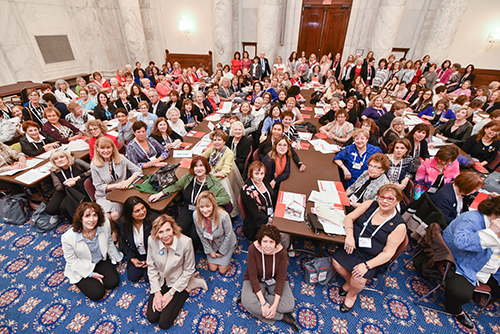
When members traveled to Capitol Hill on a rainy Thursday, they sought support for Israel and the Jewish community, women’s health equity and gun safety. “Neither rain, snow, nor lack of umbrella will keep us from our mission!” announced Debby Mazon, Hadassah’s national advocacy team leader, energizing some 260 Hadassah members in a grand Senate caucus room prior to their meetings with their local lawmakers. Naomi Brunnlehrman, director of Hadassah’s PRAZE (Programming, Advocacy, Zionism & Education) division, reviewed some of the talking points: offer hospital tours to members of Congress headed to Israel, opt for the term “gun violence” over “gun control” and recall any points of personal resonance from the summit. Before dispatching the troops, she reminded them: “Women are dismissed. Women are misdiagnosed.”
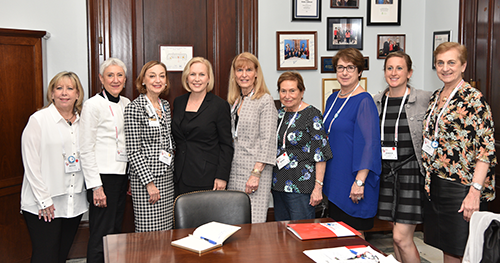
Specifically, Hadassah members asked their congressional lawmakers—including Senators Kirsten Gillibrand (D-N.Y.) and Catherine Cortez Masto (D-Nev.) and Representative Ileana Ros-Lehtinen (R-Fla.) as well as many others—to back the following legislation:
• the Never Again Education Act, which facilitates grants for anti-bias education
• the Special Envoy to Monitor and Combat Anti-Semitism Act
• an upcoming bill to combat BDS, the boycott, divestment and sanctions movement
• the Health Equity and Accountability Act to eliminate health disparities for minority communities and women
• the STOP (Students, Teachers and Officers Preventing) School Violence Act and removal of the Dickey Amendment, which prevents the Centers for Disease Control and Prevention from funding gun violence research
As Hadassah broadens its reach with new allies, approaches and members, it’s also strengthening its roots. “We’ve been on a crusade to find our nurse members,” said Susan Lafer, immediate past president of Hadassah’s Central Florida region and co-chair of its National Nurses Council, which hosted a conference session on May 15 featuring presentations on opioid abuse, aging and intimate-partner violence. The meeting, which offered continuing education credits to nurses, also featured Ruth Radiano, director of nursing at Hadassah Hospital on Mount Scopus, who discussed HMO’s leadership in areas such as organ replacement, pediatric AIDS care and cancer immunotherapy.
“Nurses and medicine are the backbone of this organization,” said Lafer, a retired nurse. She hopes to revitalize Hadassah’s network of councils by offering free courses that provide continuing education nursing credits. “You give them a Hadassah education, and we hopefully will find leaders going forward,” said Lafer. “Nurses are born leaders. We lead by example.”
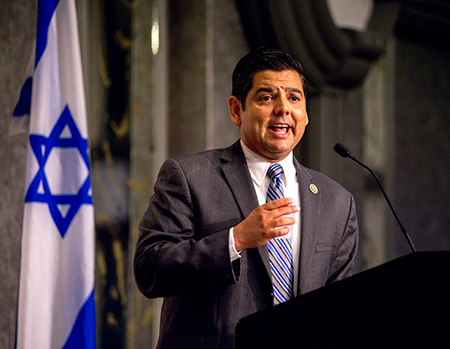
While the nurses’ session addressed matters of health in general, the summit narrowed in on women’s health disparities and the extent to which women feel undervalued and underrepresented in medical research and care.
In delivering the summit’s legislative keynote, Representative Raul Ruiz, M.D., (D-Calif.) drew on his experience as an emergency room physician in his quest to craft “a health equity bill to ensure that no woman falls through the cracks.” Ruiz spoke about Marie, a 55-year-old woman who arrived in his Coachella Valley hospital with vaginal hemorrhaging, having been discharged by a nearby hospital for her inability to pay for treatment. Marie, who never had a pap smear because she couldn’t afford it, ultimately died from cervical cancer,
he said.
Ruiz lamented health disparities for and among women, noting that America claims the highest rate of pregnancy mortality in the developed world as well as a continuing dearth of female inclusion in research.
According to the panel on women and clinical trials, women weren’t included in trials until 1993, due to the variability of the menstrual cycle as well as fears about causing birth defects. Despite the formation in the 1990s of offices devoted to women’s health across several government agencies, inequities persist—and Hadassah seeks to correct them through its advocacy.
For Kathryn Fox, more funding for myalgic encephalomyelitis/chronic fatigue syndrome (ME/CFS) could provide hope for patients like her, so devastated by lethargy that she remains largely bedridden. (For more on this issue, read Hadassah Magazine‘s March/April 2018 health column on the disease.) In an emotional plea for research into the poorly understood malady, Fox began her presentation with a slideshow of herself before and after getting sick, with a collage depicting an active, happy child supplanted by an image of her looking nearly lifeless. “This is my life now,” Fox said, crying.
In asking Hadassah delegates to tell her story, Fox closed with a pronouncement that Hadassah understands well: “Whenever women stand together, we are a force.”
Rachel Pomerance Berl is a freelance writer and proud Hadassah member in Bethesda, Md.










 Facebook
Facebook Instagram
Instagram Twitter
Twitter
Leave a Reply